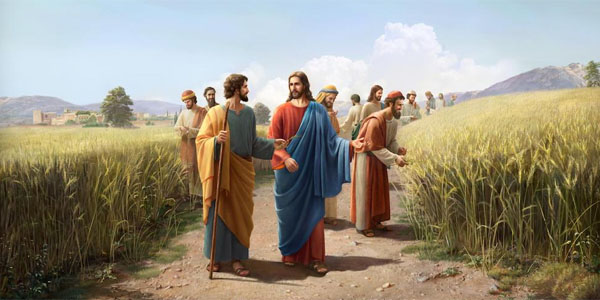
馬太福音12:1-8
那時,耶穌在安息日從麥地經過。他的門徒餓了,就掐起麥穗來吃。 2 法利賽人看見,就對耶穌說:「看哪,你的門徒做安息日不可做的事了。」 3 耶穌對他們說:「經上記著大衛和跟從他的人飢餓之時所做的事,你們沒有念過嗎? 4 他怎麼進了神的殿,吃了陳設餅?這餅不是他和跟從他的人可以吃的,唯獨祭司才可以吃。 5 再者,律法上所記的,當安息日祭司在殿裡犯了安息日還是沒有罪,你們沒有念過嗎? 6 但我告訴你們:在這裡有一人比殿更大。 7 『我喜愛憐恤,不喜愛祭祀』,你們若明白這話的意思,就不將無罪的當做有罪的了。 8 因為人子是安息日的主。」
Matthew 12:1-8
At that time Jesus went through the grainfields on the Sabbath. His disciples were hungry and began to pick some heads of grain and eat them. 2 When the Pharisees saw this, they said to him, “Look! Your disciples are doing what is unlawful on the Sabbath.”
3 He answered, “Haven’t you read what David did when he and his companions were hungry? 4 He entered the house of God, and he and his companions ate the consecrated bread—which was not lawful for them to do, but only for the priests. 5 Or haven’t you read in the Law that the priests on Sabbath duty in the temple desecrate the Sabbath and yet are innocent? 6 I tell you that something greater than the temple is here. 7 If you had known what these words mean, ‘I desire mercy, not sacrifice, you would not have condemned the innocent. 8 For the Son of Man is Lord of the Sabbath.” (NIV)
……………………..
1-2 One Sabbath, Jesus was strolling with his disciples through a field of ripe grain. Hungry, the disciples were pulling off the heads of grain and munching on them. Some Pharisees reported them to Jesus: “Your disciples are breaking the Sabbath rules!”
3-5 Jesus said, “Really? Didn’t you ever read what David and his companions did when they were hungry, how they entered the sanctuary and ate fresh bread off the altar, bread that no one but priests were allowed to eat? And didn’t you ever read in God’s Law that priests carrying out their Temple duties break Sabbath rules all the time and it’s not held against them?
6-8 “There is far more at stake here than religion. If you had any idea what this Scripture meant—‘I prefer a flexible heart to an inflexible ritual’—you wouldn’t be nitpicking like this. The Son of Man is no yes-man to the Sabbath; he’s in charge.” (MSG)

「安息日(Sabbath)」這詞來自希伯來文Shabbat,有止住、停止、止息的意思,安息日是猶太曆法一個星期的第七天,從星期五的日落到星期六的日落前。
有些學者推測安息日可能源自古巴比倫,來自亞喀得(Akkadian)語的「清除節(Sabattu)」。清除節指的是月圓時,亦即每月的十四或十五日。古巴比倫在每月的初七、十四、廿一和廿八、或其接近的日子(依月亮運行日程作計算)當作「不祥日」或「兇日」,在這些日子,先知、祭司、君王和醫生要避免做某些事,跟華人農民曆中「諸事不宜」的忌日類似。
巴比倫文化中Sabattu規定:在這日子什麼都不能作,要休息,因為是「兇日」。這顯然和以色列人的安息日截然不同,以色列人的安息日是立約的記號(結20:12),被稱為「聖日」(出20:8,申5:6)或「聖安息日」,原文意思是「分別為聖、把…奉獻給神」,是歇下工作,為歡喜敬拜神而設立的日子。
「守安息日」是立約的記號,代表以色列人和神的關係,為了確保這層關係與眾不同,新約時代的法利賽人和文士就制定出很多規矩和守則,需全都遵守才算守安息日。有個文獻記載39樣在安息日不能做的事情,不能栽種、挖土、收割、播種、煮食、紡織、解開東西、點火…。這就是為甚麼今天嚴謹的正統猶太人在安息日是不開車的,因為開車需要點燃引擎。
「安息日」的重點不在於休息,而是「分別為聖」。當法利賽人質疑耶穌的門徒在安息日經過麥地,掐起麥穗來吃,耶穌對他們說:「…但我告訴你們,在這裡有一人比殿更大。『我喜愛憐恤,不喜愛祭祀。』你們若明白這話的意思,就不將無罪的當作有罪的了。因為人子是安息日的主。」(太12:1-8)
耶穌當然比以色列人崇拜的聖殿為大,祂本身就被「分別為聖」,祂是安息日的主;耶穌說:「我父做事直到如今,我也做事。」(約5:17),祂給我們留下榜樣,在安息日做事,掐麥穗吃、醫病、趕鬼、赦罪…,為的是帶出神的恩典。
守「安息日」不在於做不做事,而在於「分別為聖」,不做事是為了專心親近神,做事是為了帶出神的恩典,做不做事皆是記念我們的歸屬,把安息日奉獻給神。
分別為聖 Sanctify Me(新心音樂事工國語專輯-牽我的手)
求祢真理洗滌,洗我身心靈的罪孽。
但願聖靈自由運行,使我成為聖潔。
願祢真理光照,看見我心中的幽暗。
無法靠著品格善行,得到上帝的喜悅。
天父,我願分別為聖!懇求聖靈洗淨,使我得以稱義,生命更像祢。
哦!耶穌,我願分別為聖!
祢曾為我流血,生命為我重寫,我要永永遠遠獻上我的感謝。

@林大惠教授

